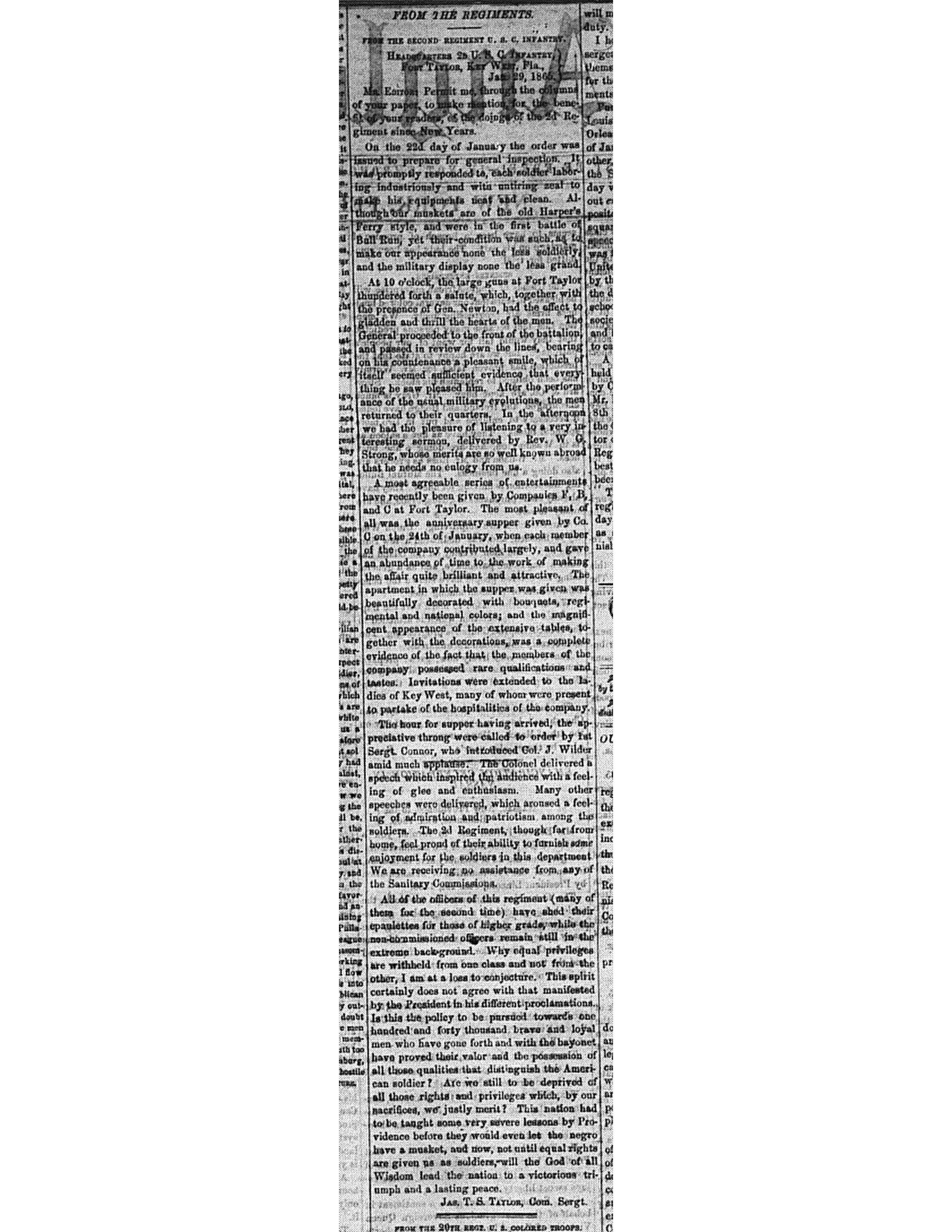James T. S. Taylor wrote to the editor of the Anglo-African describing life in the camp and questioning military policy not allowing black soldiers to be commissioned officers.
FROM THE REGIMENTS.
FROM THE SECOND REGIMENT U. S. C. INFANTRY.
HEADQUARTERS 2d U. S. C. INFANTRY, }
FORT TAYLOR, KEY WEST, Fla., }
Jan. 29, 1865. }
MR. EDITOR: Permit me, through the columns of your paper, to make mention, for the benefit of your readers, of the doings of the 2d Regiment since New Years.
On the 22d. day of January the order was issued to prepare for general inspection. It was promptly responded to, each soldier laboring industriously and with untiring zeal to make his equipments neat and clean. Although our muskets are of the old Harper’s Ferry style, and were in the first battle of Bull Run; yet their condition was such as to make our appearance none the less soldierly, and the military display none the less grand.
At 10 o’clock, the large guns at Fort Taylor thundered forth a salute, which, together with the presence of Gen. Newton, had the effect to gladden and thrill the hearts of the men. The General proceeded to the front of the battalion, and passed in review down the lines, bearing on his countenance a pleasant smile, which of itself seemed sufficient evidence that everything he saw pleased him. After the performance of the usual military evolutions, the men returned to their quarters. In the afternoon we had the pleasure of listening to a very interesting sermon, delivered by Rev. W. G. Strong, whose merits are so well known abroad that he needs no eulogy from us.
A most agreeable series of entertainments have recently been given by Companies F, B, and C at Fort Taylor. The most pleasant of all was the anniversary supper given by Co. C on the 24th of January, when each member of the company contributed largely, and gave an abundance of time to the work of making the affair quite brilliant and attractive. The apartment in which the supper was given was beautifully decorated with bouquets, regimental and national colors; and the magnificent appearance of the extensive tables, together with the decorations, was a complete evidence of the fact that the members of the company possessed rare qualifications and tastes. Invitations were extended to the ladies of Key West, many of whom were present to partake of the hospitalities of the company.
The hour for supper having arrived, the appreciative throng were called to order by 1st Sergt. Connor, who introduced Col. J. Wilder amid much applause. The Colonel delivered a speech which inspired the audience with a feeling of glee and enthusiasm. Many other speeches were delivered, which aroused a feeling of admiration and patriotism among the soldiers. The 2d Regiment, though far from home, feel proud of their ability to furnish some enjoyment for the soldiers in this department[.] We are receiving no assistance from any of the Sanitary Commissions.
All of the officers of this regiment (many of them for the second time) have shed their epaulettes for those of higher grade, while the non-commissioned officers remain still in the extreme background. Why equal privileges are withheld from one class and not from the other, I am at a loss to conjecture. This spirit certainly does not agree with that manifested by the President in his different proclamations. Is this the policy to be pursued towards one hundred and forty thousand brave and loyal men who have gone forth and with the bayonet have proved their valor and the possession of all those qualities that distinguish the American soldier? Are we still to be deprived of all those rights and privileges which, by our sacrifices, we justly merit? This nation had to be taught some very severe lessons by Providence before they would even let the negro have a musket, and now, not until equal rights are given us as soldiers, will the God of all Wisdom lead the nation to a victorious triumph and a lasting peace.
JAS. T. S. Taylor, Com. Sergt.
Printed in The Anglo-African, February 25, 1865.





